WHO Mission: Anti-COVID-19 Measures in Tajikistan Will Impact Not Only Central Asia, But Also Europe
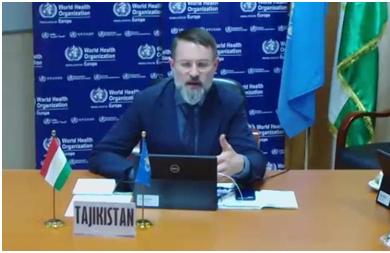
DUSHANBE, 12.05.2020. (NIAT Khovar) – Tajikistan has entered the proliferation phase of COVID-19. The measures that Tajikistan will take will have an impact on the situation not only throughout Central Asia, but also in Europe. This was stated today by the Head of the WHO mission Patrick O’Connor at an online briefing in Dushanbe.
The First Deputy Minister of Health and Social Protection of the Population of Tajikistan Saida Umarzoda noted that over 10,000 people were quarantined in the country. The government is working with WHO and other partners in tackling the COVID-19 pandemic. The Ministry of Health is aware that success cannot be achieved without universal solidarity.
O’Connor noted his confidence in the data provided by the Ministry of Health. He also noted that he will aid Tajikistan in the future at all stages of the response to the COVID-19 outbreak.
“It is always necessary to prepare for the worst-case scenario by preparing health facilities and training specialists and health workers. Now is the time to strengthen the health system and attract the public to solve this problem,” noted O’Connor.
Although COVID-19 is a public health problem, dealing with this outbreak requires the involvement of all stakeholders, government bodies, the private sector, and civil society, who must strengthen the response to the COVID-19 outbreak.
“People should know that the main measures to combat a pandemic are personal hygiene and public sanitation, the presence of a mask and refusal to visit public places. This is something that today is constantly recommended by both WHO and the Tajik Ministry of Health, and it is necessary to follow these recommendations,” said O’Connor.
It was noted that anti-COVID-19 measures may be in effect for the next three to nearly five months, so we need to be careful during this period.
The WHO Mission arrived in Tajikistan on May 1. The delegation met with senior officials, health partners and country experts.
The main purpose of their visit is to assist in assessing risks and the situation on the ground, as well as developing response mechanisms.











 Lonely Planet Includes Tajikistan among the World’s Best Travel Experiences
Lonely Planet Includes Tajikistan among the World’s Best Travel Experiences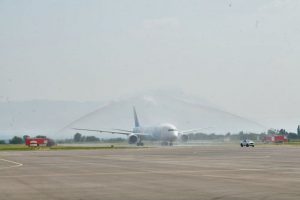 Emomali Rahmon and Xi Jinping Highlight Significance of Launching Direct Passenger Flights between Dushanbe and Beijing
Emomali Rahmon and Xi Jinping Highlight Significance of Launching Direct Passenger Flights between Dushanbe and Beijing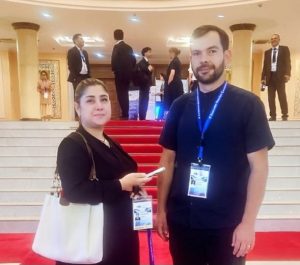 Tajikistan Provides Key Platform for Science–Policy Dialogue on Glacier Preservation, Says UCA Researcher
Tajikistan Provides Key Platform for Science–Policy Dialogue on Glacier Preservation, Says UCA Researcher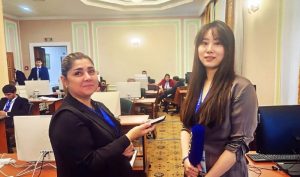 CGTN Journalist Praises Tajikistan’s Leadership on Glaciers’ Issues and Highlights China-Tajikistan Cooperation
CGTN Journalist Praises Tajikistan’s Leadership on Glaciers’ Issues and Highlights China-Tajikistan Cooperation UN Women Official Stresses the Role of Women in Climate Action at Glaciers’ Conference in Dushanbe
UN Women Official Stresses the Role of Women in Climate Action at Glaciers’ Conference in Dushanbe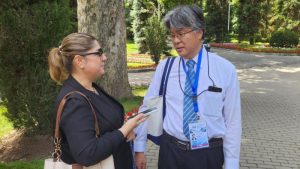 Japanese Researcher Highlights Tajikistan’s Role in Regional Water Security at High-Level Glaciers’ Conference
Japanese Researcher Highlights Tajikistan’s Role in Regional Water Security at High-Level Glaciers’ Conference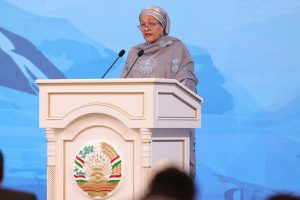 “This is Not Just Ice – This is Life”: UN Deputy Chief Calls for Urgent Action at Glaciers Conference in Dushanbe
“This is Not Just Ice – This is Life”: UN Deputy Chief Calls for Urgent Action at Glaciers Conference in Dushanbe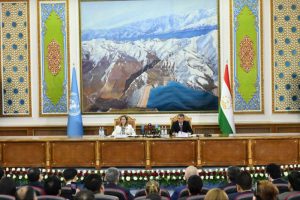 Dushanbe Hosts Landmark International High-Level Conference on Glaciers’ Preservation
Dushanbe Hosts Landmark International High-Level Conference on Glaciers’ Preservation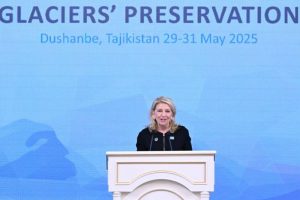 The Climate Crisis Is Primarily a Crisis of Children’s Rights
The Climate Crisis Is Primarily a Crisis of Children’s Rights Chinese Scientist Highlights Glacier Retreat as a Tangible Reality for Tajikistan, the Region, and the World
Chinese Scientist Highlights Glacier Retreat as a Tangible Reality for Tajikistan, the Region, and the World Dushanbe Conference Launches New Era in Global Glacier Diplomacy
Dushanbe Conference Launches New Era in Global Glacier Diplomacy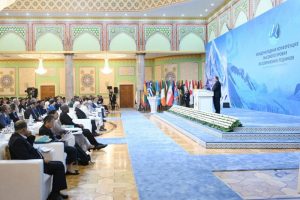 Global Leaders Urged to Fund UN Trust for Glacier Preservation
Global Leaders Urged to Fund UN Trust for Glacier Preservation














